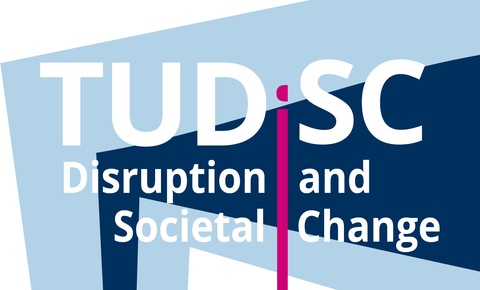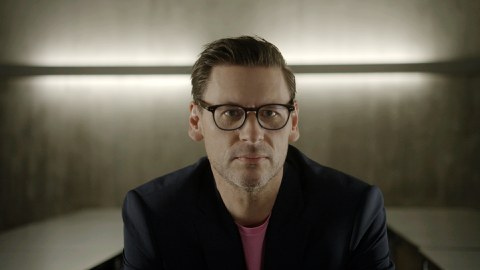Prof. Lars Koch
© Kamera: Avanga, Postproduktion: Janett Hanitzsch
Prof. Lars Koch ist Professor für Medienwissenschaft und Neuere Deutsche Literatur. 2014 war er der erste berufene Open Topic Tenure Track Professor an der TU Dresden. Im Rahmen der Exzellenzinitiative des Bundes und der Länder hat die TUD mit den Open Topic Tenure Track Professuren (OTTP) ein bundesweit einmaliges Berufungskonzept zur Gewinnung der weltweit besten Köpfe für Forschung und Lehre entwickelt. Die Suche nach Bewerber:innen erfolgte dabei unabhängig von fachlichen Bindungen und Funktionsvorgaben. Ausschlaggebende Faktoren waren einzig und allein fachliche Exzellenz sowie die Innovationskraft der zu gewinnenden Person. Nach der Ausschreibung im April 2013 gingen mehr als 1.300 Bewerbungen aus aller Welt ein, davon über 500 aus dem Ausland. In einem mehrstufigen Auswahlverfahren gab eine Findungskommission aus zwölf hochkarätigen, TUD-externen Mitgliedern schließlich ihre Empfehlungen.
Lars Koch konnte mit seinen Forschungen überzeugen, die traditionelle Fächergrenzen überschreiten – passend zu den frei ausgeschriebenen Professuren der TU Dresden. Er beschäftigt sich mit Kultur- und Medientheorie der Disruption, mit Literatur-, Medien- und Theaterkulturen destruktiver Affekte (Angst, Hass, Verachtung) sowie mit populären Medien gesellschaftlicher Selbstbeschreibung, wie beispielsweise dem Film oder der TV-Serie. Über Fächergrenzen hinweg untersucht Koch, wie analoge und digitale Medien technische Neuerungen, Risikowahrnehmungen oder auch gesellschaftliche Konflikte adressieren und prägen. Dafür forscht er mit Literatur-, Medien- und Kulturwissenschaftler:innen sowie soziologisch und historisch arbeitenden Kolleg:innen – aber auch mit Forschenden aus ganz anderen Disziplinen wie Ingenieur:innen, die in Dresden sehr gut vertreten sind.
Ein Beispiel für die interdisziplinäre Zusammenarbeit ist das Projekt Disruption and Societal Change (TUDiSC), das Lars Koch mitinitiiert hat. Als Maßnahme des TUD-Exzellenzprogramms erforscht TUDiSC gesellschaftliche Disruptionsprozesse. Aktuell werden acht Projekte gefördert, die sich mit Disruption als Grundeigenschaft gesellschaftlicher Wirklichkeit und Veränderung auseinandersetzen, und gemeinsam von Geistes- und Sozialwissenschaftler:innen sowie Forscher:innen aus anderen Bereichen, z.B. Mathematik und Naturwissenschaften oder Bau und Umwelt, geleitet werden.
Vier Fragen an Prof. Lars Koch
Woran forschen Sie?
Ich halte mich sehr gern zwischen den Fächern auf und interessiere mich für die Konfliktualität von Gesellschaft, d. h. wie Konflikte, Machtansprüche und Deutungshegemonien kulturell ausgehandelt werden. Mein Zugang dazu ist über die Massenmedien, die Populärkultur und die sozialen Medien.
Was bedeutet Exzellenz für Sie?
Aus meiner Perspektive bedeutet Exzellenz Freiraum für langes und manchmal auch wildes Denken, für Interaktion mit vielen guten anderen Wissenschaftler:innen sowie die Möglichkeit, auch Studierende punktuell mit einzubeziehen, aber vor allem im Team über einen längeren Zeitraum an bestimmten Problemen arbeiten zu können – und das herausgelöst aus dem normalen Alltagsgeschäft.
Was macht die TU Dresden besonders?
Die TU Dresden ist ein sehr bekannter und toller Standort, vor allem für die Natur-, Lebens- und Technikwissenschaften, aber nun auch mehr und mehr für die Geistes- und Sozialwissenschaften. In den letzten Jahren hat sich hier eine unheimliche Dynamik breitgemacht. Wir haben mit dem Thema Disruption – den großen Herausforderungen des 21. Jahrhunderts und wie diese gesellschaftlich verhandelt werden – ein Thema gefunden, an das viele anschließen können. Ich bin guten Mutes, dass das auch in der nächsten Exzellenzrunde weiter Früchte tragen wird.
Wieso ist gerade die Stadt Dresden für Ihre Forschung interessant?
Für mich als Medienwissenschaftler, der sich für soziale Konfliktlagen und deren Aushandlung interessiert, ist Dresden mit seiner langen Protestgeschichte im Positiven wie im Negativen fast schon so etwas wie ein Laboratorium der heutigen Krisenwahrnehmung. Auf der einen Seite interessiere ich mich für das Digitale, auf der anderen Seite aber auch für das Materielle, wie die Verhandlungen von Konflikten im öffentlichen Raum.


